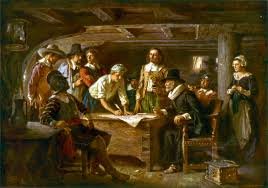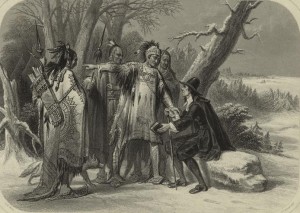
Roger Williams and the Prophetic Blueprint for Religious Liberty
Roger Williams’ framework for religious liberty in Rhode Island was the blueprint for religious liberty in the United States and help fulfill its prophetic destiny as a refuge from persecution. The Constitution’s First Amendment channels William’s view of the separation of church and state, where the government will not establish a national religion to force its citizens to support and worship, nor would it restrict the expression of one’s religious preference.
Read More
Hard-fought religious freedom something to celebrate this Thanksgiving
Households throughout the United States are celebrating a presidentially designated Thanksgiving Day. It provides us an opportunity to reflect on the blessings we enjoy as a nation and personally.
The history of this holiday goes back to the arrival of the Pilgrims at Plymouth, Mass., in the late autumn of 1620. Although the New World saw intermittent European activity after the arrival of Christopher Columbus in 1492, in the minds of many, American history truly began with the Pilgrims.
Because most of the occupants of the Mayflower had belonged to a persecuted religious minority in England — Congregationalists, part of the dissenting church movement — they came seeking freedom to practice religion in concert with each individual’s own conscience. But the Pilgrims’ quest was by no means the only reason America came to be viewed as a shelter from religious persecution and intolerance.
Read More
Christians Equipped to Work for Liberty of Conscience for All
By Karen Scott, Esq. – Protecting conscience requires sensitivity, understanding and often courage. While many working in the area of liberty of conscience have no religious affiliation, Christians should be especially equipped to work in this field remembering that each of us is created in God’s image and that God wants each individual to follow Him as a response to His love and not because of any force, threat or unduly restrictive law.
Read MoreWe Separate Church and State for a Reason – Romney’s Perspective on Religion and the Presidency
On December 6, 2007, candidate Mitt Romney gave this speech at the George H. W. Bush Presidential Library in College Station, Texas in order to reach evangelicals who were concerned about how Romney’s Mormon religion might affect his presidency. Michael Luo of The New York Times gives some background on the speech. The transcript […]
Read MoreHISTORICAL SKETCH: Roger Williams, Apostle Of Religious Freedom
By Ellen G. White – The framers of the Constitution recognized the eternal principle that man’s relation with his God is above human legislation, and his rights of conscience inalienable. Reasoning was not necessary to establish this truth; we are conscious of it in our own bosoms. It is this consciousness which, in defiance of human laws, has sustained so many martyrs in tortures and flames. They felt that their duty to God was superior to human enactments, and that man could exercise no authority over their consciences. It is an inborn principle which nothing can eradicate.”
Read MoreThe First Baptist in America (Florida Baptist Witness)
The earliest Baptists in America stemmed from a group of like-minded individuals who surrounded Roger Williams. It was on Feb. 5, 1631, that Roger Williams (1603-1683) and his wife sailed from Bristol on the ship Lyon and landed at Nantasket, in the Massachusetts Bay Colony.
Read MoreJ. Brent Walker – “Church and State in the USA: Promises and Challenges”
This thought-provoking address was given by J. Brent Walker of the Baptist Joint Committee for Religious Liberty at the Congress on Religious Liberty in Buenos Aires, Argentina on April 28, 2008. It was originally posted on the BJC website (bjcpa.org) and is reposted here in its entirety with permission. Good morning! I appreciate the kind […]
Read MoreGovernment, Religion, and a Mythical Past
- Karen Scott
- June 1, 2008
- America
- bill of rights
- Civil Rights
- criminal law
- Due Process Clause
- Establishment Clause
- founders
- historical revisionism
- learning from the past
- national heritage
- polygamy
- religious discrimination
- religious harassment
- Roger Williams
- Separation of Church and State
- Spectrum Magazine
- Ten Commandments
- thought crime
- Tibet
- Walt Pontynen
- War
- workers' rights
- World
By Karen Scott, Walt Pontynen, and Leigh Johnson In this article, originally published in Spectrum in 2002, the authors discuss the intent of the founders of the United States and how historical revisionism obscures our national heritage. (Re-posted with Permission.) AMERICAN PHILOSOPHER and poet George Santayana (1863-1952) wrote, “Those who cannot remember the past are […]
Read More